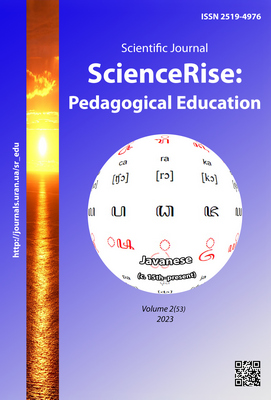Activation of the student's learning potential by educational coaching
DOI:
https://doi.org/10.15587/2519-4984.2023.279568Keywords:
educational coaching, methodology, multi-faceted approach, competencies, analysis, interaction, personal development, collaborationAbstract
The article delves into the concept of educational coaching in the context of technical higher education institutions. Educational coaching is examined in terms of its methodology and techniques, which distinguish it from other forms of education. The focus is on the multi-faceted approach of coaching that aims at personal development and can significantly enhance the learning potential of students. The chosen coaching methodology determines the specific areas of development that are prioritized.
The main principles of educational coaching include prioritizing personal development in education, facilitating individuals to reach their full potential, developing competencies, and overcoming obstacles that hinder achieving personal and professional goals. Educational coaching also involves creating a plan of action in collaboration with the student and nurturing a productive and active partnership between the teacher and the student. The article emphasizes that educational coaching is based on interaction between the participants of the educational process. This interaction is rooted in dialogue, and the information-psychological approach takes into account cognitive style, including mental processes, such as comparison, analysis, synthesis, generalization, classification, conceptual connections, and deduction.
The cognitive development strategy begins with an orientation towards action. Communication is viewed as a form of connection, which involves information exchange and interaction, with the main objective of stimulating action and regulating the flow of information. The article stresses that educational coaching plays a pivotal role in facilitating significant and long-lasting personal and professional changes.
Overall, the article highlights the significance of educational coaching as a powerful tool that can activate the students' learning potential. It also underscores the importance of the interactive and dialogical approach in the coaching methodology, which is crucial in achieving successful and sustainable outcomes. Educational coaching prioritizes personal development in education and helps students reach their full potential, thereby enhancing their competencies and overcoming obstacles to achieve their personal and professional goals
References
- Viera, C. A. (2021). A Comparison of Mentoring and Coaching: What's the Difference. Performance Improvement, 60 (7), 13 20. doi: https://doi.org/10.1002/pfi.21993
- Stokes, P., Fatien Diochon, P., Otter, K. (2020). “Two sides of the same coin?” Coaching and mentoring and the agentic role of context. Annals of the New York Academy of Sciences, 1483 (1), 142–152. doi: https://doi.org/10.1111/nyas.14316
- Hussey, L., Campbell-Meier, J. (2020). Are you mentoring or coaching? Definitions matter. Journal of Librarianship and Information Science, 53 (3), 510–521. doi: https://doi.org/10.1177/0961000620966651
- Knight, J. (2007). Instructional Coaching: A Partnership Approach to Improving Instruction: Corwin Press, 256.
- Toll, C. A. (2018). Educational coaching: A partnership for problem-solving. ASCD, 152.
- Aguilar, E. (2013). The Art of Coaching: Effective Strategies for School Transformation. Paperback: Jossey-Bass, 368.
- Whitmore, J. (2009). Coaching for Performance: Growing Human Potential and Purpose – The Principles and Practice of Coaching and Leadership. London: Nicholas Brealey Publishing, 244.
- Laba, K. (2011). Coaching for school improvement: A practical guide for coaches and their clients. Academic Development Institute, 76.
- Carol, C. (2015). Learning Styles in Higher Education. A Case Study in History Training. Procedia – Social and Behavioral Sciences, 180, 256–261. doi: https://doi.org/10.1016/j.sbspro.2015.02.113
- Lofthouse, R., Leat, D., Towler, C. (2010). Coaching for teaching and learning: a practical guide for schools. CfBT Education Trust, 40. Available at: https://www.ncl.ac.uk/media/wwwnclacuk/cflat/files/coaching-for-teaching.pdf
- Strieker, T. S., Shaheen, M., Hubbard, D., Digiovanni, L., Lim, W. (2014). Transforming Clinical Practice in Teacher Education through Pre-Service Co-Teaching and Coaching. Educational Renaissance, 2 (2), 39–62. doi: https://doi.org/10.33499/edren.v2i2.71
- Garner, P., Turnnidge, J., Roberts, W., Côté, J. (2021). How Coach Educators Deliver Formal Coach Education: A Full Range Leadership Perspective. International Sport Coaching Journal, 8 (1), 23–33. doi: https://doi.org/10.1123/iscj.2019-0074
- Stanier, M. B. (2016). The coaching habit: Say less, ask more & change the way you lead forever. Page Two, 244.
- Papailiou, D., Kipreos, G., Travlos, A. K., Strigas, E. (2015). Coaching Evaluation, Coaching Environment and Environmental Criteria that Influence Coaching Performance: An Overview. Scholars Journal of Arts, Humanities and Social Sciences, 3 (6B), 1174 1177.
- Peterson, D. B.; Stober, D., Grant, A. (Eds.) (2006). People are complex and the world is messy: A behavior-based approach to executive coaching. Evidence-Based Coaching Handbook. New York: Wiley, 416.
- Kleen, A. (2021). The Effectiveness of Academic Coaching in Improving Academic Performance of First-Year At-Risk Students in American Universities. Digital Commons. Electronic Theses and Dissertations. Paper 350. Available at: https://digitalcommons.acu.edu/etd
- Iveson, C., George, E., Ratner, H. (2011). Brief Coaching: A Solution Focused Approach (Essential Coaching Skills and Knowledge). Routledge, 206.
- Grover, S., Furnham, A. (2016). Coaching as a Developmental Intervention in Organisations: A Systematic Review of Its Effectiveness and the Mechanisms Underlying It. PLOS ONE, 11 (7), e0159137. doi: https://doi.org/10.1371/journal.pone.0159137
Downloads
Published
How to Cite
Issue
Section
License
Copyright (c) 2023 Iryna Myskiv, Olena Sydorchuk, Veronika Dmytruk

This work is licensed under a Creative Commons Attribution 4.0 International License.
Our journal abides by the Creative Commons CC BY copyright rights and permissions for open access journals.
Authors, who are published in this journal, agree to the following conditions:
1. The authors reserve the right to authorship of the work and pass the first publication right of this work to the journal under the terms of a Creative Commons CC BY, which allows others to freely distribute the published research with the obligatory reference to the authors of the original work and the first publication of the work in this journal.
2. The authors have the right to conclude separate supplement agreements that relate to non-exclusive work distribution in the form in which it has been published by the journal (for example, to upload the work to the online storage of the journal or publish it as part of a monograph), provided that the reference to the first publication of the work in this journal is included.








